Louisville, KY: Using partnerships to enhance open data
An application of our community-engagement impact framework
Sunlight’s community engagement impact framework provides cities with open data programs a blueprint for executing, tracking and assessing their community engagement strategies around open data. To show what this framework looks like in practice, we applied it to capture the past and ongoing work of Louisville Metro Government’s Open Data Program.
The following application summarizes the inputs, activities, outputs, outcomes, and potential impacts associated with Louisville Metro Government’s (LMG) open data program and its related engagement work. Because we are unable to capture the longer-term impacts of their work, for the impacts section we describe actions the City could take to assess more qualitative impacts.
1. Inputs
High quality, easily accessible open data
- Louisville Open Data has 222 datasets available
Resources and tutorials available for users with varying degrees of data skills
- How to Use This Site includes guidelines for beginner users of open data as well as documentation of supported APIs for developers
Opportunities for users to engage with the open data portal
- The Open Data Contact Form helps users submit general inquiries, suggest publishing a dataset, report incomplete data, suggest an idea for data analysis, propose a partnership, flag technical issues, recommend a feature for the site, and request assistance in using the open data portal
- The Open Data Gallery Submission form allows users to submit any app, tool, or visualization made with Louisville Open Data
- The Data Collaboration and Partnership form encourages residents, community members, non-profits, universities, journalists, civic technologists, and companies to propose a partnership or collaborative project with Louisville Open Data
- Integrated feedback & discussion tool allows users to discuss datasets and ask questions
2. Activities
Host or participate in community meetings about open data to share information and solicit input from community members
- Louisville Open Data aims to host quarterly Open Data Community Open Houses
Host in-person or online trainings or workshops around using open data
- LMG Open Data has hosted several internal trainings and hackathons, aimed at familiarizing city employees with data and tech
- Analog Hackathon for city employees to familiarize those new to Hackathons with the concept
- Hackathon for city employees and city government partners using real-time, anonymized traffic data from Waze
- Data analytics training hosted by GovEx
- Training on visualization tool Power BI
Launch partnerships with local journalists, academics, community organizations, and civic tech groups
- In 2018, Louisville Open Data partnered with University of Louisville’s Speed School of Engineering and University of Pennsylvania’s Master of Urban Spatial Analytics program for capstone projects
- Louisville Open Data regularly partners with Code for Kentuckiana for events such as Civic Technology Meetups
Showcase stories and tools built with open data (by Louisville Metro Government or partners)
- Open Data Gallery features projects and services that have been developed using Louisville Open Data
Distribute newsletters or blog posts sharing open data updates
- Data Officer posts updates and articles on Louisville’s Office of Performance Improvement and Innovation’s Medium page
Share updates, respond to users, promote open data, and solicit feedback on social media
- Data Officer shares Open Data news on Twitter
3. Outputs
Downloaded or viewed datasets
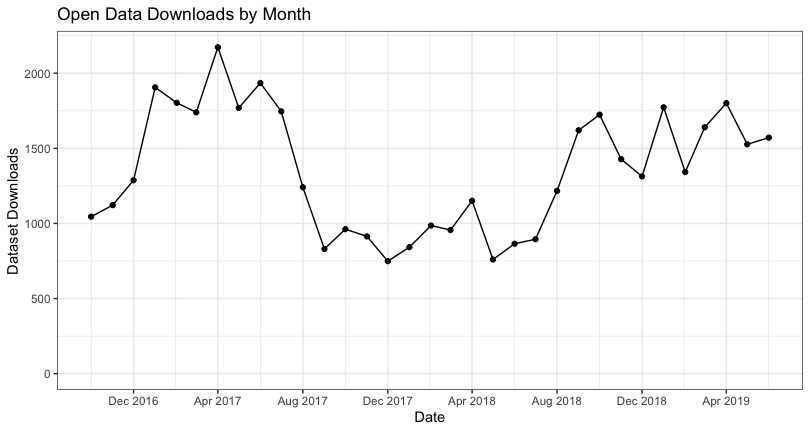
Classroom uses of open data
- Partnership with University of Pennsylvania’s Master of Urban Spatial Analytics program led to 3 student projects using Louisville Open Data including:
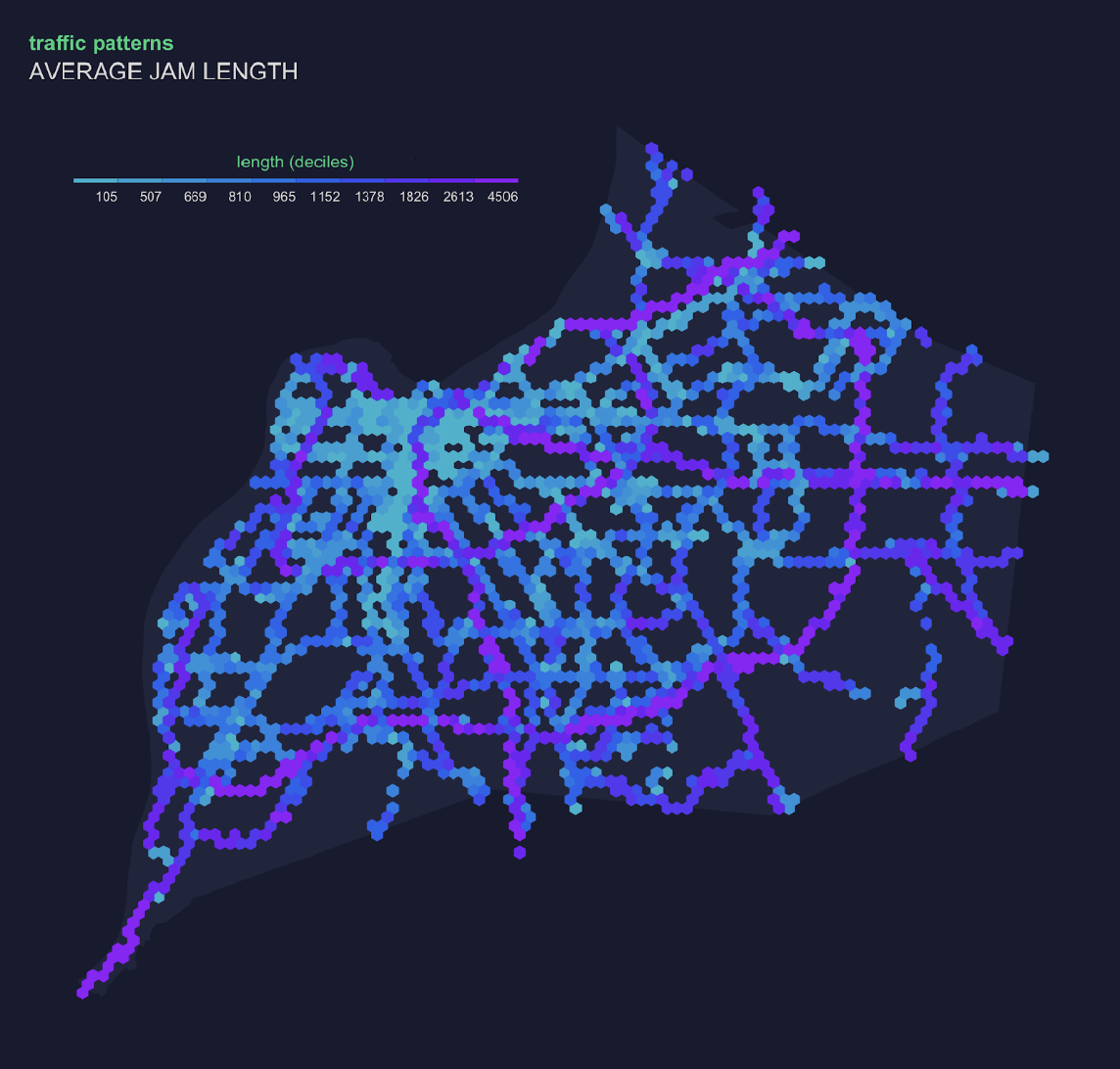
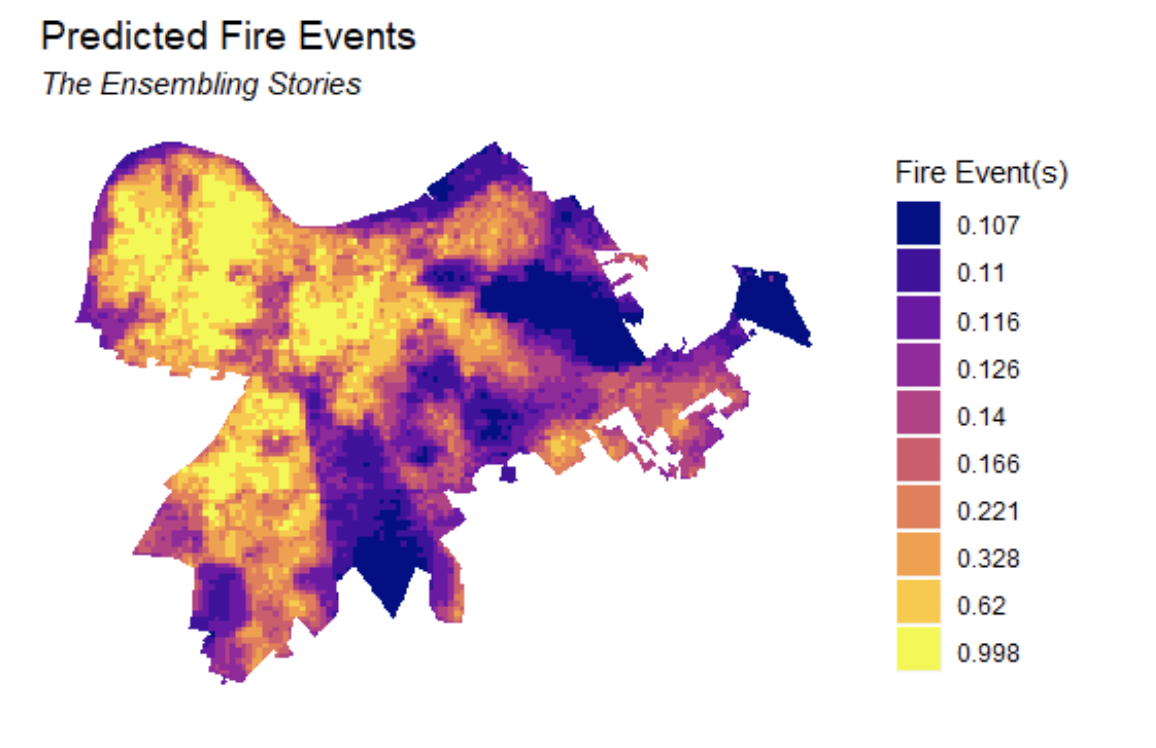
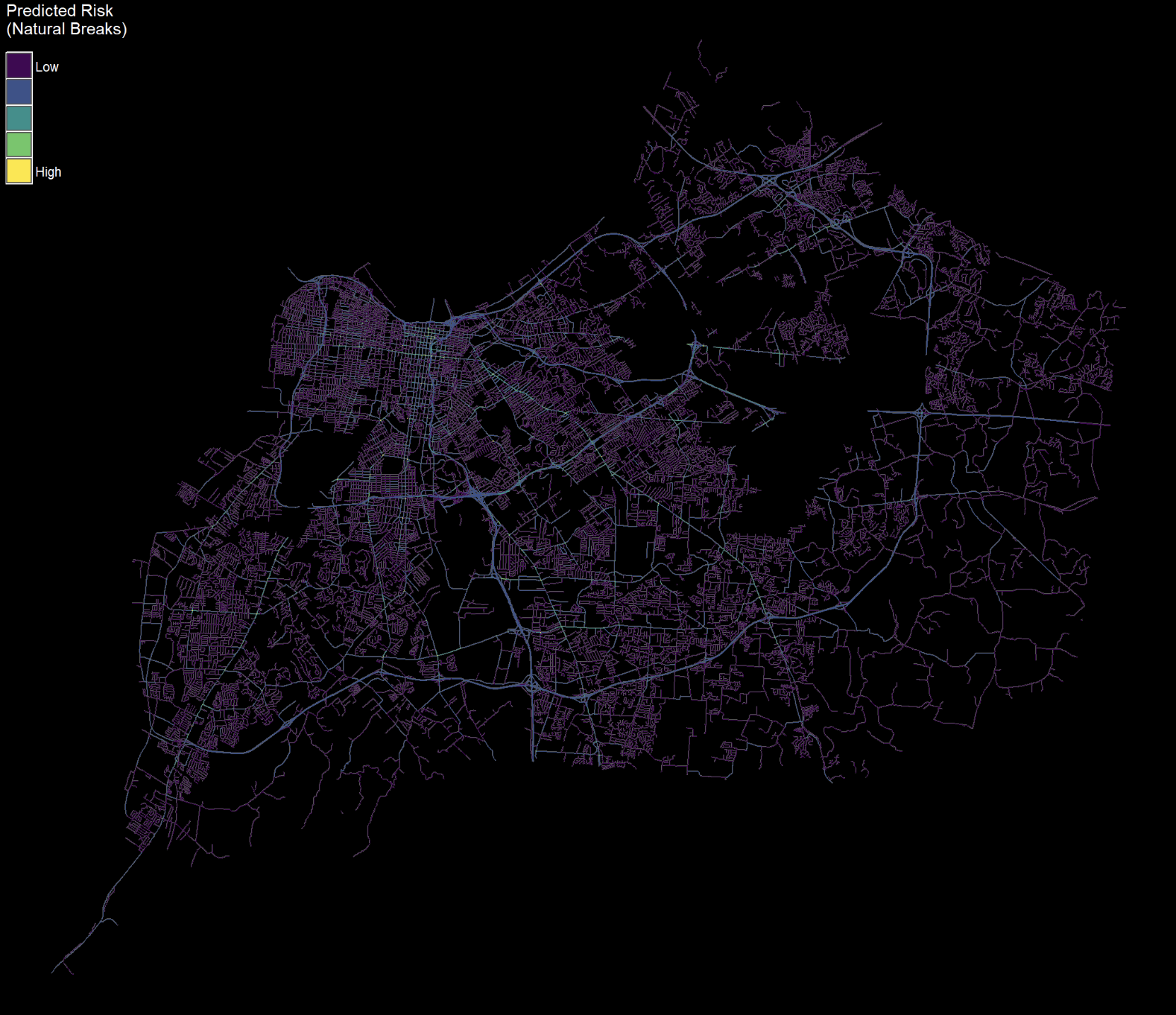
News articles citing open data as a source
- In 2018 and 2019, 7 articles available online cited Louisville Open Data as a source for their reporting including this WFPL story analyzing Louisville’s 311 trash complaints
Research articles citing open data as a source
- 5 scholarly articles have referenced Louisville Open Data:
- The effect of information salience on product quality: Louisville restaurant hygiene and Yelp.com
- A Dataset for Performance Analysis of the Social Internet of Things
- Big data and smart (equitable) cities
- The President’s Role in Advancing Criminal Justice Reform
- What Open Data Says About Post-Harvey Mosquito Threats
Data stories or tools developed by individual residents or community organizations
- Louisville Open Data Gallery showcases projects that include:
- 16 companies using Louisville Open Data for their products
- 12 visualizations built with open data
- 2 research projects that used open data in their analysis
4. Outcomes
Partners are transforming raw data into tools or visualizations which allow a wider audience to gain insights from open data
- Civic hacking events, partnerships, and educational uses of data have continued to produce new data products and visualizations
Community events hosted by Open Data Program lead to more open data users
- While trends in data downloads cannot definitively be attributed to engagement efforts or events without surveying users, examining the timing of various community events and how they correlate with increases in dataset downloads can help a city determine if events make any potential impact on open data usage
- The chart below marks the dates of various events hosted by Louisville Open Data along with total dataset downloads (in this case there is not a clear indication of correlation between dataset downloads and events occurring)
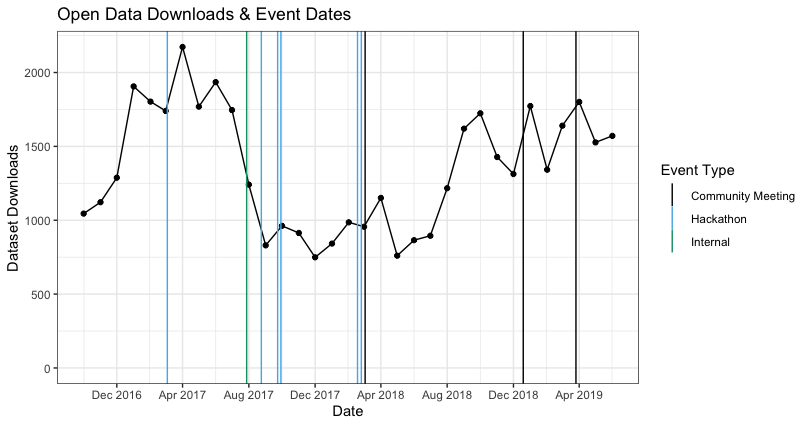
Ongoing engagement between Louisville Metro Government and open data users in which one informs the other
- Creating connections in person with open data users as well as community organizations and businesses allows Louisville’s Open Data team to keep a pulse on who is making use of open data, how, and why
- Louisville Open Data can gather feedback from users to understand how they can continually improve
Louisville Open Data gains insight on open data users’ needs and how best to continue support
- By hosting events for new and experienced open data users, Louisville Open Data staff can learn first hand from attendees about their users’ needs and bow they can continue to improve their program
5. Impacts
As noted in our introduction to this framework, quantifying longer-term impacts is challenging, and evaluating success often relies on more qualitative evaluations. Listed here are the potential impacts of Louisville’s community engagement work around open data, with specific methods for how the City could assess them.
Residents from a diverse range of backgrounds use open data to make day-to-day decisions, improve their work, or engage with government
- By surveying event attendees, sending out surveys to users, or simply having conversations with users, cities can gain insight on how open data is being used and by whom
- Including questions about users’ background information such as demographics, education, profession and where they reside can help shed light on how diverse the city’s open data users are
Educators improve lesson quality by using available Louisville Open Data; students are more civically engaged
- By communicating and building relationships with educators who are using open data in their classrooms, the open data program can be tuned in to how open data is benefitting students’ educational experiences
Local journalists, academics, nonprofits, and business groups make more data-driven decisions; users working on local social issues have a better, data-informed understanding of their city
- By tracking the related outputs, the open data team can stay informed on the degree to which organizations are shaping their strategic goals with city data as a resource
Residents and organizations can build data and tech products with open data that Louisville Metro Government uses to govern
- The open data team can work with local civic tech groups to keep tabs on whether there is consistent or growing interest in developing tools with open data
Louisville Metro Government has a positive reputation with a diverse audience, representative of the local population
- The open data program can work with other agencies and elected representatives to conduct initiatives aimed at measuring public perception of local government
Residents regularly provide feedback to the Louisville Metro Government on different government decisions, including open data program governance
- The open data program could partner with elected representatives or community organizations to incorporate open data into meeting agendas that involve public input

